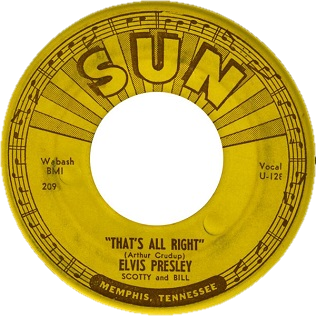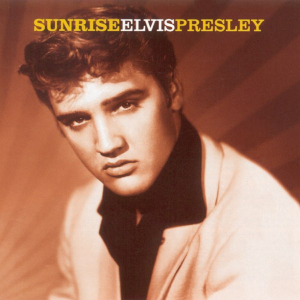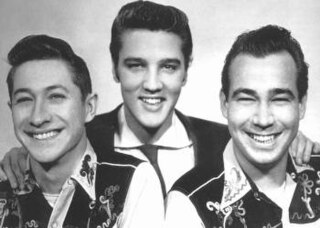
Carl Lee Perkins was an American guitarist, singer and songwriter. A rockabilly great and pioneer of rock and roll, he began his recording career at the Sun Studio, in Memphis, beginning in 1954. Among his best-known songs are "Blue Suede Shoes", "Honey Don't", "Matchbox" and "Everybody's Trying to Be My Baby".

An acetate disc is a type of phonograph record generally used from the 1930s to the late 1950s for recording and broadcast purposes and sees limited use as of 2009.

"Hound Dog" is a twelve-bar blues song written by Jerry Leiber and Mike Stoller. Recorded originally by Big Mama Thornton on August 13, 1952, in Los Angeles and released by Peacock Records in late February 1953, "Hound Dog" was Thornton's only hit record, selling over 500,000 copies, spending 14 weeks in the R&B charts, including seven weeks at number one. Thornton's recording of "Hound Dog" is listed as one of the Rock and Roll Hall of Fame's "500 Songs That Shaped Rock and Roll", ranked at 318 in the 2021 iteration of Rolling Stone's 500 Greatest Songs of All Time and was inducted into the Grammy Hall of Fame in February 2013.

William Patton Black Jr. was an American musician and bandleader who is noted as one of the pioneers of rock and roll. He played in Elvis Presley's early trio, The Blue Moon Boys. Black later formed Bill Black's Combo.

Sun Studio is a recording studio opened by rock-and-roll pioneer Sam Phillips at 706 Union Avenue in Memphis, Tennessee, on January 3, 1950. It was originally called Memphis Recording Service, sharing the same building with the Sun Records label business. Sun Studio is perhaps most famous for its role in the early years of Elvis Presley’s career.

"That's All Right" is a song written and originally performed by the American blues singer Arthur Crudup and recorded in 1946. It was rereleased in early March 1949 by RCA Victor under the title "That's All Right, Mama", which was issued as RCA's first rhythm and blues record on its new 45 rpm single format.
"My Happiness" is a pop music standard which was initially made famous in the mid-twentieth century. An unpublished version of the melody with different lyrics was written by Borney Bergantine in 1933.

"Million Dollar Quartet" is a recording of an impromptu jam session involving Elvis Presley, Jerry Lee Lewis, Carl Perkins, and Johnny Cash made on December 4, 1956, at the Sun Record Studios in Memphis, Tennessee. An article about the session was published in the Memphis Press-Scimitar under the title "Million Dollar Quartet". The recording was first released in Europe in 1981 as The Million Dollar Quartet with 17 tracks. A few years later more tracks were discovered and released as The Complete Million Dollar Session. In 1990, the recordings were released in the United States as Elvis Presley: The Million Dollar Quartet. This session is considered a seminal moment in rock and roll.

Elvis' Golden Records is a compilation album by American rock and roll singer Elvis Presley, issued by RCA Victor in March 1958. It compiled his hit singles released in 1956 and 1957, and is widely believed to be the first greatest hits album in rock and roll history. It is the first of five RCA Victor Elvis' Golden/Gold Records compilations, the first four of which were issued during Presley's lifetime. The album peaked at number three on the Billboard Top Pop Albums chart and was certified 6× platinum on August 17, 1999, by the Recording Industry Association of America.

Elvis for Everyone! is the eighth studio album by American singer and musician Elvis Presley, issued by RCA Victor in mono and stereo, LPM/LSP 3450, on August 10, 1965. Recording sessions took place over a ten-year span at Sun Studio in Memphis, RCA Studio B in Nashville, Tennessee, and Radio Recorders in Hollywood, California. It peaked at number 10 on the Top Pop Albums chart.

Sunrise is a two-disc compilation of Elvis Presley's studio recordings at Sun Studio from 1953 to 1955, released in 1999, RCA 67675-2. This set features all of the surviving master recordings made by Presley and his accompanists, Scotty Moore and Bill Black, occasionally augmented by other musicians, prior to his arrival on RCA Records in 1956.

The King of Rock 'n' Roll: The Complete 50's Masters is a five-disc box set compilation of the complete known studio master recordings by American singer and musician Elvis Presley during the decade of the 1950s. Issued in 1992 by RCA Records, catalog number 66050-2, it was soon followed by similar box sets covering Presley's musical output in the 1960s and 1970s. This set's initial long-box release included a set of collectible stamps duplicating the record jackets from every Presley LP on RCA Victor, every single that had a picture sleeve, and most of his EP releases. The set includes a booklet with an extensive session list and discography, and a lengthy essay by Peter Guralnick. It peaked at #159 on the album chart and was certified a gold record on August 7, 1992, by the RIAA. Further certifications were for platinum on November 20, 1992, and for double platinum on July 30, 2002.

"I Forgot to Remember to Forget" is a 1955 rockabilly and country song, first recorded by Elvis Presley and written by Stan Kesler and Charlie Feathers. It was Elvis' first no. 1 record nationally. The single was the fifth and final single released on Sun Records before Elvis moved to RCA Records.
"Tryin' to Get to You" is a song written by R&B singer songwriters Rose Marie McCoy and Charles Singleton. It was originally recorded by the Washington DC vocal group The Eagles in 1954 and released in mid-1954 on Mercury Records 70391. The format of the title on The Eagles’ record was “Tryin’ to Get to You”, with an apostrophe.

The Blue Moon Boys were an American rock and roll band that was formed by Elvis Presley, lead guitarist Scotty Moore and double bass player Bill Black. The group members were introduced by Sun Studio owner Sam Phillips in 1954, except for D.J. Fontana, who joined the group during a Louisiana Hayride tour in 1955. The Blue Moon Boys were inducted into the Musicians Hall of Fame and Museum in 2007. The band was named after Bill Monroe's song "Blue Moon of Kentucky".

Elvis' Greatest Shit is a bootleg recording of Elvis Presley, released in July 1982. It assembles a number of studio recordings—including some film scores—and outtakes intended to represent the worst recordings Presley made in his career.
Joseph Anthony Tunzi is an American, Chicago, Illinois-based author, publisher, and producer. He has been described as "a renowned author from Chicago" and "one of the foremost authorities on Elvis Presley," authoring, self-publishing, and producing over 60 titles about Presley, amongst others, for the past 35 years. Tunzi has also compiled a massive photo archive, from which he licenses photographs of Presley. Tunzi is credited as an Elvis Presley Archivist Extraordinaire in the August 2023 Paramount+ streaming feature-length documentary, Reinventing Elvis: The '68 Comeback.
"Playing for Keeps" is a song originally recorded by Elvis Presley. Its first release on record was on January 4, 1957, on a single with "Too Much" on the other side. "Playing for Keeps" reached number 34 in the United States, while "Too Much" spent 3 weeks at number 1. In 1959, the song was included on Elvis's album For LP Fans Only.














